
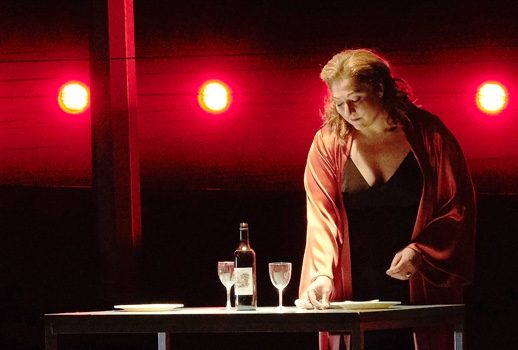
Goerke, an acclaimed Elektra, was emerging as a leading hochdramatisch soprano, and, not long after the COC announcement, was named by Peter Gelb as the Brünnhilde of the Metropolitan Opera’s upcoming Ring revival in the 2018-19 season. Toronto audiences have been treated to her first crack at Wagner’s warrior goddess, after which she has taken her interpretations to the Houston Grand Opera (where she is headed again this spring) and subsequently the Lyric Opera of Chicago.
Tackling the Götterdämmerung Brünnhilde for the first time, Goerke has fulfilled her promise as the next great exponent of Wagner’s iconic Valkyrie. Goerke’s dramatic work is often defined by the vulnerability she brings to her roles. Her Brünnhilde is notable for its palpable humanity, a quality she highlights in all her interactions with others—with her new husband Siegfried, with her sister Waltraute, or with her Gibichung oppressors. This humanity highlights the emotional state of a new bride awoken from years of slumber and navigating the world as a mortal, and it brings emotional weight to the desperation of her cries of betrayal in the second act.
Vocally, Goerke was in fine form, pouring out torrents of sound when the music calls for it, but also singing with detail and finesse. Her weighty voice has a contralto warmth in its lower reaches and the tone gains in intensity as it ascends the scale. Though her voice loses volume in its higher reaches, she still knows how to juice key high notes for potency, like in her passionate cries in the second act. At the conclusion of the Prologue, she delivered the final high C tentatively but then swelled the note to thrilling effect.
Her Siegfried, Andreas Schager, made an impressive company debut. He brandished a true heldentenor with unflagging stamina and brilliant, penetrating tone. The singing had a slightly “bellowy” quality which might foreshadow a wobble to come. But the voice rang out excitingly and rode the huge waves of Wagner’s orchestra with ease. His Siegfried was self-assured and likeable, which made Gunther’s conflicted relationship with him believable, especially after Brünnhilde casts doubt on his past. One only wishes that he had incorporated more delicacy into his robust vocalism.
Also making his COC debut, bass Ain Anger was an impressive Hagen. His voice is satisfyingly dark in colour and weighty in size. And he is able to scale the climaxes with confident high notes. He was a compelling presence, less stentorian than some exponents of the role and not afraid to display his inner conflict, as in his Hagen’s Watch in the first act. In public scenes, he exuded a suave confidence with a malevolence bubbling beneath the surface that kept other characters nervously on edge.
Martin Gantner was a suitably vain and insecure Gunther. His baritone is not glamorous in tone but is at home in Wagner’s music. As his sister Gutrune, Illeana Montalbetti’s more lyric instrument sounded slender (though always audible) compared to the Wagnerian-sized voices on stage with her, but she sang attractively (including as the Third Norn) and gave a touching portrayal.
Mezzo soprano Karen Gargill highlighted Waltraute’s desperation, making the most of the Valkyrie’s single scene, and singing the part (and the Second Norn) with a warm, appealing mezzo. Lindsay Ammann was not the most powerfully voiced First Norn but still brought true contralto colour to the lowest notes. Later, after a near four-hour break, she returned convincingly as Flosshilde. Robert Pomakov gave a powerfully sung and urgent Alberich, who realizes that he is losing his grip on his son.
As in any great performance of this grand opera, the orchestra was the biggest star. Music Director Johannes Debus shaped many beautiful passages, and led the drama with well-judged tempi. He reveled in the quiet sections as much as the fortissimo explosions. Recognizing the Wagnerian-scaled voices at his disposal, he did not hold the splendid COC Orchestra back in the big moments.
If that resulted in a singer occasionally being drowned out, the compromise was worth it in the powerfully achieved climaxes, like Hagen’s first greeting of Siegfried in the first act, or Brünnhilde being consumed by a wave of sound in her final phrase. The COC Orchestra was clearly enjoying themselves, with robust strings, luminous woodwinds, and gorgeously melded brass.
Tim Albery returned to direct the revival of this production which first debuted in 2006. With stark sets (and complementary costumes) by Michael Levine, the production sets the drama in the modern world. The staging is mostly minimal, with heavy emphasis on black sets, accented by David Finn’s effective lighting. The Gibichung scenes play out in a corporate office building, with the first act scene in a chic executive office, and the second act in a board room.
The second act’s prominent feature is a giant board table, which serves as a stage for the protagonists. When Hagen summons his men, they arrive in grey suits, brandishing spears, and mount the table. Later, most of the act’s high drama is played out atop the table with the chorus watching in fascination from below.
Outside of the corporate office, the scenes are dominated by giant power lines hanging over a bare stage. In the first scene, the Norns weave the strands of one of these cables. The characters are dressed mostly in black. And there’s a linkage between the Norns and the Rhinemaidens who are similarly dressed in black trench coats and headwear. When meeting Siegfried, the daughters of the Rhine shed their outer wear to reveal white lingerie and fluorescent blue wigs. They desperately put on a show to entice Siegfried at first (including some cheesy shadow-play) but later returned in black attire and stern demeanor as they warned the hero of his impending doom.
For the Immolation, the stage was bare as Goerke’s regal Brünnhilde commanded the stage, but in the final passages, members of the chorus brought pieces of Valhalla and placed them on stage. And as Valhalla burned to the ground, they looked out into the hall which was illuminated by red light projected on the auditorium’s white, bulbous ceiling. Even when staging grand opera (Aida, War & Peace, Les troyens), Albery’s greatest skill is in his handling of the characters’ intimate interactions. Every cast member acted with a confidence and ease that allowed this grandest instalment of Wagner’s tetralogy to play out as a human drama.
I attended the final performance of the run. For this finale, the COC brought the members of the orchestra on stage for a company bow and the principals were instructed to take their time taking solo bows in front of the curtain as the orchestra assembled behind. Schager really took his time during his bow (though the enthusiastic audience did not seem to mind) and Goerke improvised by walking on stage during his bow and mockingly scolding him to get off and give her a chance.
The audience loved it. And it was a telling feature of this likeable, down-to-earth soprano that she didn’t bask diva-like after having completed one of the most daunting roles in the repertoire. Rather, she laughed heartily as the audience gave her a rapturous ovation. May she return soon.
Photo: Michael Cooper















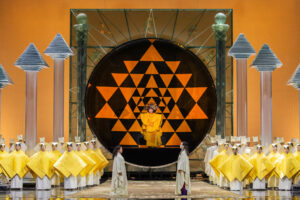
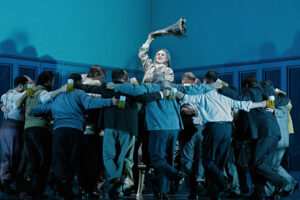

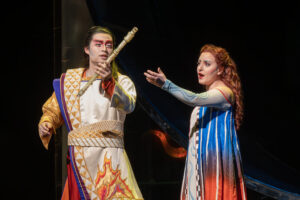
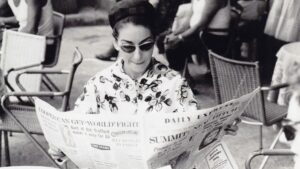





Comments